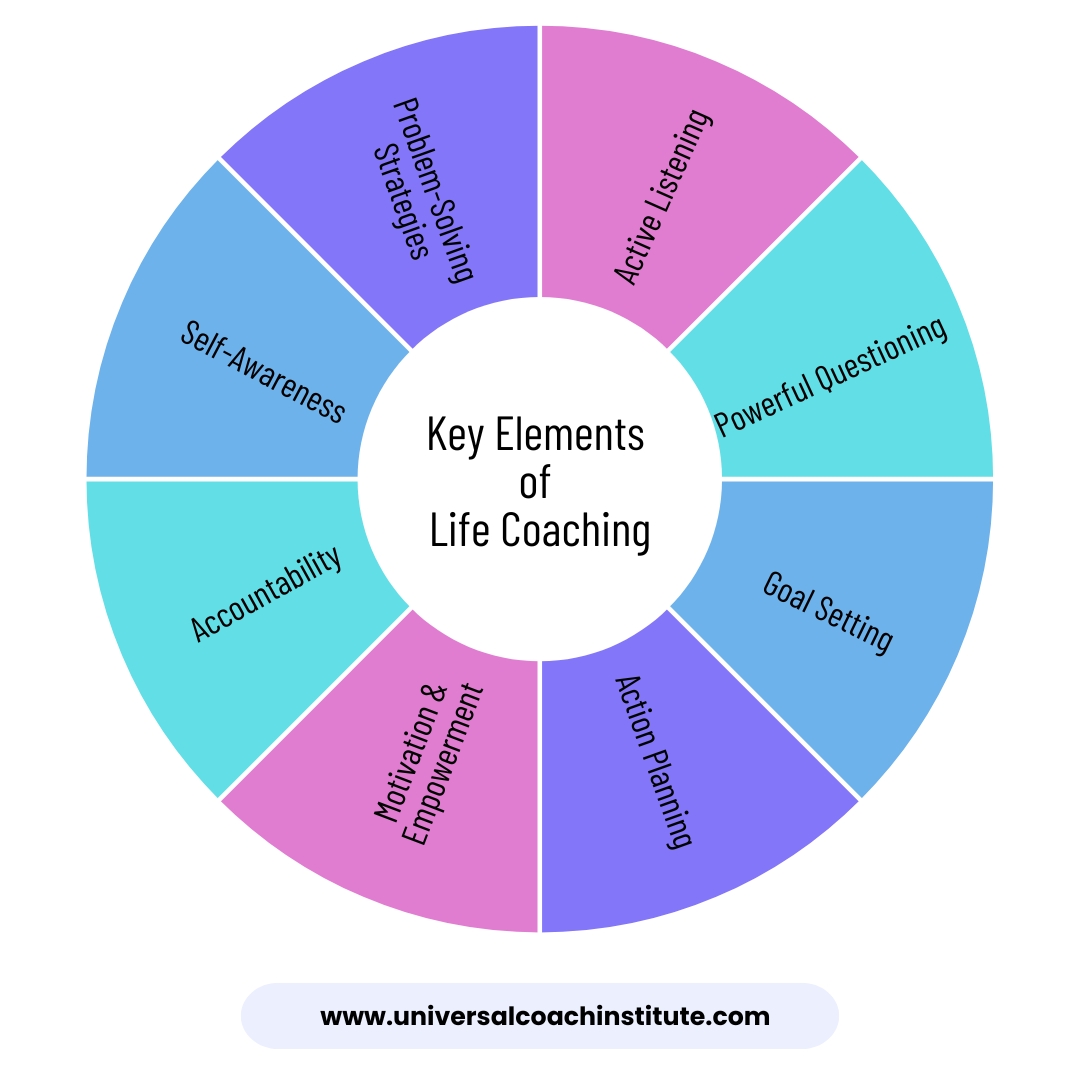Life coaching is a collaborative process where a coach helps individuals set and achieve personal or professional goals, enhance self-awareness, and overcome obstacles to create a fulfilling life.
It goes beyond advice-giving and listening—it focuses on future-oriented growth and actionable strategies.
Whether seeking personal growth, navigating a career change, or aspiring to become a life coach, life coaching offers a structured and impactful way to empower individuals to realize their goals.
This post will walk you through what life coaching is, how it works, who it benefits, and—most importantly—how it can transform lives.
In This Post
- 1 What is a Life Coach?
- 2 What is Life Coaching?
- 3 Key Elements of Life Coaching
- 4 How Does Life Coaching Work?
- 5 Benefits of Life Coaching
- 6 Who Needs a Life Coach?
- 7 How is Life Coaching Different from Therapy or Mentoring?
- 8 Common Misconceptions About Life Coaching
- 9 How to Get Started with Life Coaching
- 10 Take Home
What is a Life Coach?
A life coach is a trained professional who helps individuals achieve personal and professional goals.
They provide guidance, support, and accountability, empowering clients to make positive changes.
Coaches work on various issues, including personal development, career development, and health.
Through structured conversations, they help clients gain clarity, create action plans, and overcome obstacles, serving as trusted partners in transforming lives and unlocking potential.
What is Life Coaching?
Life coaching is a collaborative and purposeful conversation designed to help individuals get from where they are to where they want to be.
It’s not the same as therapy. Therapy focuses on diagnosing and healing past traumas. Life coaching is about taking action and moving forward.
Key Elements of Life Coaching
- Active Listening: A life coach attentively listens to what the client is saying and not saying to understand and uncover the client’s needs.
- Powerful Questioning: Trained coaches are skilled in asking powerful questions that create awareness and action.
- Goal-setting: Life coaches assist clients in creating Specific, Measurable, Achievable, Realistic, and Timely (SMART) goals.
- Action Planning: A Plan of action is co-created to help the client reach the goal.
- Motivation and Empowerment: Trained life coach uses their coaching skills to motivate and empower their clients to succeed.
- Accountability: A life coach holds clients accountable and ensures they meet their goals.
- Self-Awareness: Life coaches use powerful questions to help their clients create awareness.
- Problem-Solving Strategies: When obstacles and challenges arise, the life coach helps the client develop problem-solving strategies to move forward.
Example Scenario:
Stephanie feels stuck in her life. She is unsure why she feels unfulfilled despite having everything she thought she wanted. She decides to work with a life coach. The life coach works with Stephanie to explore her emotions and regain a sense of purpose.
In their sessions, the life coach uses active listening and asks her questions like, “What activities or moments in your day bring you joy?” and “When was the last time you felt truly at peace?” to help create awareness. Through this awareness, Stephanie realizes she has been overwhelmed by constant obligations and neglecting herself.
Next, the life coach helps Stephanie create a SMART self-care goal and action plan to achieve it.
Her goal is to practice self-care by dedicating 30 minutes daily to activities that help her relax and recharge, such as reading, journaling, meditating, or walking. She will track her progress daily using a journal to stay consistent. She will schedule this time during her lunch break or evening routine. This practice will help her to reduce her stress and improve her mental well-being. She has decided to commit to it for 30 days before evaluating its impact.
Over time, Stephanie begins to feel lighter and more connected to herself. Coaching helps her rediscover what matters most and make small, meaningful changes that restore her sense of balance and fulfillment.
How Does Life Coaching Work?
Life coaches meet with their clients on a cadence. This can be once a week or once a month; it’s totally up to the coach and client. Sessions can be one-on-one or in a group, and they can be face-to-face, over the telephone, or virtual.
The Coaching Process
Here’s an overview of the coaching process:
- Discovery Session: This is the initial meeting where the coach and client discuss the goals for coaching and decide if they will be a good fit to work with each other.
- Coaching Agreement: Next, a coaching agreement is made between the coach and the client on what the client will work on during coaching.
- Action Plan: Coaches assist clients in defining their desired outcomes and establish small action steps to take each week to achieve those goals.
- Monitor Progress & Accountability: The coach and client hold regular meetings to discuss progress and any challenges the client might face in completing the action steps.
- Adjust Strategies: When challenges arise or plans change, the coach and client may agree to adjust the plan.
- Celebrate Success: Regardless of size, the life coach celebrates the client’s success in achieving their goal. At this point, the coaching agreement may conclude, leading to the creation of a new one.
Coaching Techniques
Life coaches use many techniques. Here are some of the most common:
- SMART Goals – to help clients create structured and achievable goals
- Visualization Exercises – to help clients get a clear vision on specific topics
- Brainstorming – to help clients come up with their own answers
- Role Playing – to help clients work out anticipated situations and conversations
- Reframing – to help clients see situations, problems, or beliefs from another point of view
- Motivational Interviewing – to help clients who are resistant or having a difficult time with change
Benefits of Life Coaching
What makes life coaching so impactful? Its ability to deliver tangible, long-lasting benefits for personal and professional growth.
Personal Benefits
- Self-Confidence and Motivation: Life coaching empowers individuals to become more confident and motivated in reaching their goals.
- Clarity and Awareness: It helps individuals clarify and achieve their true desires.
- Happiness and Fulfillment: Clients often say they can finally achieve long-time dreams.
- Work-Life-Balance: Life coaching assists individuals in prioritizing different areas of their lives without feeling overwhelmed.
- Improved Mental Health: Individuals learn to use coaching tools to manage acute stress and anxiety.
Professional Benefits
- Career Advancement: Life coaching assists individuals in identifying their career goals and creating a clear path to achieve them.
- Leadership Development: Coaching equips individuals with the tools and confidence needed to grow as leaders and effectively guide others.
- Time Management: Life coaching assists individuals in managing their time effectively to accomplish more without feeling overwhelmed.
- Productivity: Coaching helps individuals concentrate on what matters most to increase productivity.
- Job Satisfaction: Coaching helps clients to enjoy their work as they have greater clarity of their goals and how to achieve them.
- Improved Performance: In life coaching, individuals learn strategies to enhance performance and boost confidence in the workplace.
Research shows life coaching has measurable benefits. An ICF study found that 80% of people who received coaching reported increased self-confidence. 73% said their relationships improved.
In the workplace, 86% of companies reported they made back their investment in coaching. 70% of clients said coaching improved their work performance.
A survey of 100 executives found coaching provided an average return on investment of almost six times the cost of coaching.
Who Needs a Life Coach?
Life coaching is versatile and appeals to various individuals for various reasons. This includes life, health, career, relationships, etc.
Some people who may want or need a life coach include:
Individuals who:
- struggle to achieve their goals
- wants to make a life or career change
- would benefit from accountability
- is feeling stuck
- lacks motivation
Signs You May Need a Life Coach
- Feeling stuck or unmotivated despite efforts.
- Struggling to achieve personal or professional goals.
- Seeking an accountability partner to stay on track.
- Desiring guidance in finding life purpose and direction.
- Needing support in creating work-life balance.
- Wanting to improve relationships and communication skills.
Coaching enhances specific areas of life and improves overall well-being and performance.
How is Life Coaching Different from Therapy or Mentoring?
Understanding how life coaching compares to therapy or mentoring is key to deciding whether it’s right for you.
Life Coaching vs. Therapy vs. Mentoring
Life coaching focuses on helping individuals clarify their goals, identify what they truly want, and develop actionable steps to achieve them. Life Coaching is action-oriented and focused on the present and the future. In life coaching, the client is the expert in their own life; they have the answers, and the life coach is there to guide them towards those answers using their coaching skills.
Therapy focuses on healing the past, addressing emotional challenges, and diagnosing and managing mental health concerns. In therapy, the therapist is the expert. Their goal is to understand why specific behavior patterns exist, to work through traumas, and to make recommendations on how the client should proceed.
Mentoring focuses on guiding an individual to achieve goals the mentor has already accomplished. In mentoring, the mentor is the expert and has all the answers. The mentee follows the mentor’s advice for success.
In short, therapy helps with healing, mentoring provides advice and guidance, and life coaching helps you move forward and take action toward your dreams.
| Aspect | Life Coaching | Therapy | Mentoring |
|---|---|---|---|
| Focus | Future-oriented, goal setting, and personal growth. | Healing the past, emotional well-being, and mental health. | Guidance based on personal experience in a specific area. |
| Approach | Actionable steps and strategies to move forward. | Exploring and addressing past traumas or challenges. | Advice and recommendations based on expertise. |
| Relationship | Collaborative partnership to empower change. | Client-therapist relationship with a focus on support and healing. | Mentor shares personal experience and acts as a guide. |
| Outcome | Achieving goals and building confidence for the future. | Improved emotional and mental health. | Gaining insights and strategies to navigate a specific path. |
| Expertise | The client is the expert; the coach helps draw out their insights. | The therapist is the expert in guiding healing and managing mental health. | The mentor is the expert, sharing their personal knowledge and experience. |
Common Misconceptions About Life Coaching
Despite its growing popularity, life coaching is often misunderstood. Here are some myths—debunked.
Myth: “Life coaching is only for people with problems.”
Truth: Life coaching is for anyone who wants continued growth no matter where you are in life.
Myth: “Life coaching is therapy or counseling.”
Truth: Life coaching helps individuals set and achieve goals, focusing on action and the future. Unlike therapy, it emphasizes progress rather than exploring past experiences.
Myth: “Life coaching is about giving advice.”
Truth: A life coach guides clients through self-discovery. They help them find answers inside of themselves. They offer support and accountability, but the client is the expert on their own life.
Myth: “Life coaching results are instant.”
Truth: Life coaching is a journey that takes action, time, and commitment. Everyone’s length of time for results varies.
Myth: “Life coaching is expensive.”
Truth: Coaching pricing and packages vary per coach.
How to Get Started with Life Coaching
Hire a Life Coach
Not all coaches are created equal. So, before you hire a life coach, consider these factors:
- Training (and Certification): Training is more important than Certification. However, the number one way to know if a life coach is trained is through their Certification. A trained life coach will understand how to use coaching tools and techniques to get results.
- Specialization: Find a coach with experience in the area you need help with or someone who can relate. A life coach specializing in your needs will be better equipped to address common challenges than a general life coach.
- Connection: Coaching is a personal and intimate relationship. So, before you sign a coaching agreement, schedule a discovery session to ensure you and the coach are a good fit.
Become a Certified Life Coach
Curious about becoming a coach?
Our comprehensive life coaching certification program equips you with the coaching skills and knowledge you need to guide others toward success.
Gain the expertise to make a positive impact and contribute to the transformative world of personal development. Start your journey today and discover the possibilities that await you in the world of life coaching.
Enroll in our Life Coach Training Program and Begin Your Transformation →
Take Home
Whether you’re looking to tackle personal challenges, grow in your career, or find a deeper sense of purpose, life coaching gives you the tools to make it happen.
Are you ready to take the first step toward transformation? Find the life coach who’s right for you—or explore how you can become one and help others create real change!







